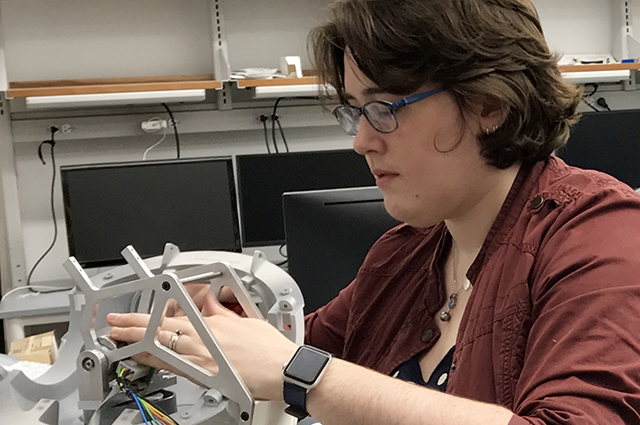Accessibility in tech

Clare Boothe Luce Assistant Professor Elaine Schaertl Short was recently a panelist with AnitaB.org for a conversation titled The Accessible Future of Tech. In conversation with the President and CEO of AnitaB.org, Brenda Darden Wilkerson, and with an audience of over 200 remote participants, Short discussed a variety of issues related to disability and accessibility in tech, with fellow panelists Michele Williams of M.A.W. Consulting, LLC — Making Accessibility Work, and Shiri Azenkot of Cornell University. During the panel discussion, Short shared her research goals and spoke on ways to navigate a tech career as a disabled person, advice for organizations, and the effects of the pandemic on disabled people.
As a disabled researcher and strong advocate for diversity in computing, Short identified disability justice as a core guiding principle of her work. Her research is at the intersection of assistive technology and human-robot interaction, with a focus on developing new algorithms that let robots help users more effectively. She takes a broad view of assistance and accessibility to include thinking about ways that robots can effectively learn from and interact with all users, especially non-technologists and others who are typically under-served by traditional robotics research.
Short’s advice for organizations? Be specific when advertising events. Disabled guests need accurate information to make informed decisions about how to attend and whether to request accommodations. A disabled attendee might need to know whether there will be stairs, information that will only be presented visually, or loud noises and bright lights. In hiring, organizations should educate themselves on the many types of assistive technology that are available when developing job descriptions; for example, screen readers mean that the ability to see is not a requirement for word processing or email. Finally, getting involved with disability-focused organizations such as the Tapia Conference and AccessComputing is a great way for organizations to stay informed.
The panel also touched on the ways that pandemic has created a different reality for all of us. As Short pointed out, the pandemic has increased access for some people. Someone with a mobility impairment that affects their ability to travel may be able to attend conferences virtually now. For others, it has created challenges since many of the new technologies being used have not been made accessible, especially for those who use closed captions or screen readers. Going forward, Short challenged the audience to keep the best aspects of remote work, virtual spaces, and online events, while making sure that all of our spaces, virtual and real, are accessible for everyone.
Short has a long-standing connection with AnitaB.org: as a student, she attended the Grace Hopper Celebration many times, and was chosen as a Google Anita Borg Memorial Scholar during her senior year of college. Now known as the Women Techmakers Scholars Program, the program remains an excellent opportunity for women undergraduate students.
To learn more, view the panel discussion. Professor Short can be reached at elaine.short@tufts.edu for further questions or concerns.
Department:
Computer Science